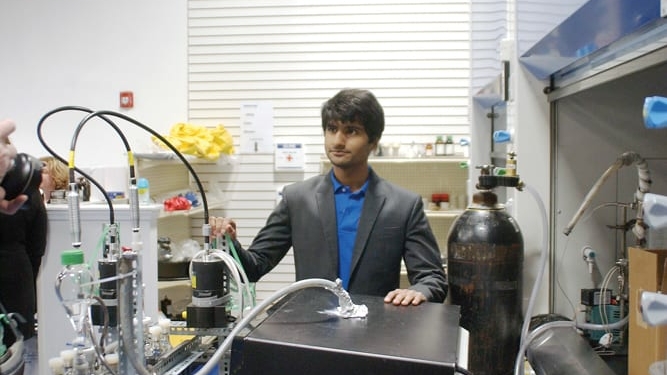It began with a group of college students and a standard household microwave in an RPI lab. Three years later, ThermoAura has expanded out of the lab and into its own high-tech facility, where employees manufacture and develop thermoelectricity using nanotechnology. ThermoAura started in the Rensselaer Polytechnic Institute in Troy as a lab experiment, said co-founder and company president Rutvik Mehta. “We started cooking materials in a microwave,” he said. “Literally a microwave that you probably have in the house where you might heat coffee. We were actually cooking nanomaterials.” The founders then took their experiments out of the lab and into the manufacturing facility, where the company is ready to produce tons of high efficiency thermoelectric nanomaterials starting next year. Thermoelectric technology is often used to convert wasted heat from tech devices and turn it into renewable electricity. The company now has 70 employees, which is mostly recent graduates from RPI, SUNY Polytechnic Institute and Cornell University. “Thermoelectricity just takes heat. Just apply some sort of heat to it and electricity will come out,” said Mehta. “What we do is we make building blocks, very tiny, that’s the nano, and that gives [thermoelectrics] much higher efficiency. High efficiency, low cost, higher value. We make many, many tiny nanoboxes and we actually make bigger units.” The company recently celebrated the grand opening of its state-of-the-art facilities at 132 Railroad Ave. in Latham on Friday, Dec. 5. The startup also touted a second large investment from Eastern New York Angels (ENYA). A company that invests not only funds, but also business mentorship to starting entrepreneurs, ENYA previously invested $150,000 in ThermoAura. Out of 900 applications, ENYA invested seed funds into only seven business ideas. ThermoAura was lucky to be one of those seven. Last week, the group provided ThermoAura with another $100,000 to expand the business.
ENYA co-founder and managing partner Joe Richardson said his company invests only part of the commitment initially, and then provides more once certain milestones are met. “I’m pleased to say that they are meeting their milestones,” Richardson said of ThermoAura. “They’re commercializing, they’re getting into manufacturing, and so we’re pleased to do a follow-on $100,000 investment. The technology the company uses to create the nanomatieral, a larger microwave than the standard household models, are custom designed to suit the needs of ThermoAura. However, Mehta said that in some of labs the standard microwaves are still being used. With the money from ENYA, ThermoAura will do further research to expand, as well as creating and getting new operating equipment. Currently, ThermoAura concentrates on manufacturing nanomaterial for thermoelectricity.
The company has customers that it sells the nanomatierals to, which can be custom engineered. The technology can be used for a variety of things, Mehta said, including in manufacturing cars and refrigerators. “No moving parts, no green house gases. It’s all clean and green,” Mehta assured.
According to Colonie Town Supervisor Paula Mahan, bringing companies like ThermoAura, which produce new forms of efficient and clean energy, to the area has been a recent goal. “It’s wonderful for us, and the location is perfect, right next to the nano-college,” Mahan said. “This is the type of business that brings high paying jobs to the town, so as this business grows, those high-paying tech jobs will come with it. And that’s what it’s all about. It’s about every area of tech or service-oriented, or government, that there are a variety of jobs and a variety of services that are provided to the town.” Her sentiment was echoed by Congressman Paul Tonko, who commended the ThermoAura team by offering “hope in terms of job creation” and adding to the growing economy. “What we applaud and celebrate is that you’re adding to the cluster of the talent in this area that grows us as one of the most fertile areas to land clean energy, high-tech innovation jobs. That talent that’s clustering here allows all of us to prosper in the process,” said Tonko. While the company was founded in 2011, the work to open the ThermoAura building in Latham was finalized around March of last year, according to Mahan. Since then, the company has been working to get set up and established in the area. ThermoAura is currently looking for employees, but over the next year, Mehta said, he hopes the company will provide even more jobs as the business gets going. Although currently concentrated on manufacturing nanomaterials for thermoelectricity, Mehta said the company would like to expand into creating generators powered by thermoelectrics, among other projects. “We plan to have more investments in the plant next year,” said Mehta. “The current line, as I said, is making nanomaterials, but we’re going to do more cool things with the materials, like make wafers, and basically move up the vertical chain of the value.”
From the lab to reality
Leave Comment



